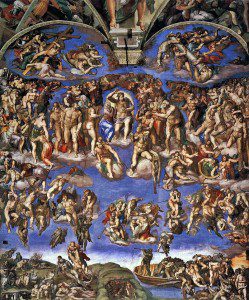The Last Judgment, Michelangelo (1536-41) [public domain / Wikimedia Commons]
I think it would be helpful to use the terminology of “desiring that all men be saved” (as the Bible says about God) or “praying for all men to be saved” or “Jesus made it possible on the cross for any men to be saved.” I.e., universal atonement rather than universalism . . . Those statements shouldn’t be controversial at all for anyone who knows their theology.
Saying that we “hope hell will be empty” does seem to at least possibly imply (or to be misunderstood as saying) that there is a real possibility that it is or may be, which is simply not biblical. Some of the needless controversies can, I think, be avoided by using different (I would say, a built more precise) language.
If I recall correctly, I don’t think that the Bible itself ever uses the phraseology of “hope all men will be saved” or similar. Perhaps I’m mistaken. I just did a search on the online Bible that I use (RSV) for “hope / saved” and “hope / salvation” appearing together, and came up with nothing along these lines. If anyone can produce that connection, please do. I’d be very interested in seeing it.
But the Bible does definitely teach (in many passages) the three ways of expressing a similar but different idea (praying for all, desiring, universal atonement), above.
In any event, hell is not gonna be empty! We know the end of the story, in the inspired Word of an omniscient God. I submit that it is debatable that we should reasonably hope for something (an empty hell) we know for sure (from revelation) will not happen. Jesus sure seemed to teach that many will be in an eternal hell, not a few or none (as do many prominent private revelations that lots of Catholics accept; but no Catholic is bound to those).
Explicit passages about judgment, such as Matthew 25 (that one is right from Jesus’ mouth) do not imply in the slightest (or so it seems to me, prima facie, anyway) that hell will be a lonely outpost with a few souls; let alone wiped out (as annihilationists, such as Seventh-Day Adventists and Jehovah’s Witnesses believe). I think folks can reasonably debate relative numbers of the saved / elect and the lost, or reprobate, or damned, but I don’t see how it’s biblically possible to post (or hope) that only a few or none are lost.
We know that hell is not empty from the following passage (among others):
Revelation 20:13-15 (RSV) And the sea gave up the dead in it, Death and Hades gave up the dead in them, and all were judged by what they had done. [14] Then Death and Hades were thrown into the lake of fire. This is the second death, the lake of fire; [15] and if any one’s name was not found written in the book of life, he was thrown into the lake of fire.
The lake of fire is hell. Hades (Hebrew, Sheol) is the netherworld where the dead await final judgment (see Luke 16 for a description). Those who are damned will go from Hades to hell. And those not written in the Book of Life will go there. This is not speculation. This is biblical prophecy and a description of what occurs in the end times.
Just for the record: I have defended Bishop-elect Robert Barron, by the way (who is blasted in this regard), against the charge of universalism, even while I have critiqued his questionable views about the biblical Adam and Eve of Genesis as the historical, primal human pair. I think he’s a great teacher and good man who has seriously mistaken (theologically liberal, in this instance) views about Adam and Eve (while not denying original sin). He’s not alone in being misunderstood; in fact, he’s in very good company. Former Catholic apologist and now geocentrist fanatic Robert Sungenis argued with a straight face that Pope St. John Paul II was a universalist. I defended John Paul the Great, of course. I’ve also defended the great mystic, Julian of Norwich against bogus charges that she was a universalist.
Fellow Patheos blogger Larry D wrote in a related post on this general topic yesterday, that “[W]e may certainly hope that all will be saved, while at the same time not expecting everyone to be saved.” That’s not far from, if not identical, to what I am saying here. But if we say, simply, “I hope that all will be saved and that hell will be empty,” it seems to straightforwardly suggest a very real possibility of universalism. Certainly, logically and grammatically, that is implied, or (more accurately) could possibly be what is intended. And so there are misunderstandings and huge pointless controversies (I’ve observed them again and again).
If we’re misunderstood a lot on a particular issue, it’s time to modify our language, and acknowledge some blame for that.
See also a post on this issue from Patheos blogger Tom Zampino, from four days ago.














